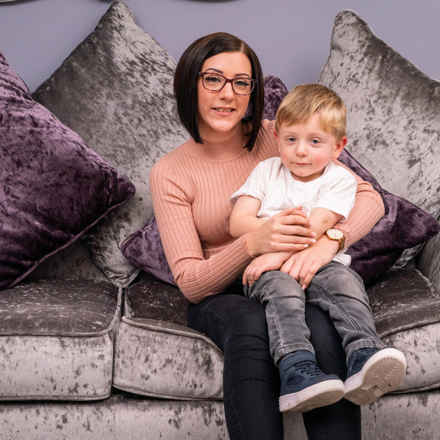'I've had to find new ways of coping and new things to focus on'
Posted: Monday 18 May 2020
After living with diabetes for 23 years Lisa, aged 33, is all too aware of the complications that come with the disease and has always been careful to manage her condition.
But one thing Lisa was not prepared for was the impact the disease could have on her eyesight.
Just over two years ago, when she was pregnant with her first child, she started noticing changes to her vision and was diagnosed with diabetic macular oedema (DMO) – the biggest cause of sight loss in diabetics.
She said: "Losing my sight has been the biggest thing. Because I can go from being alright, I think I’m coping and dealing with everything, having a child, and dealing with my diabetes, and I feel like I’m constantly visiting hospital for something, but now I have this eye condition I can get so low. It impacts my work, it impacts everything I do, the way that I feel, how I am around other people. it’s massive, and to be honest with you, I hate it."
Lisa had been looking forward to life as a new mum, but remembers it being an incredibly lonely and anxious time.
"It was horrible when my son was first born," she said. "I didn’t want to leave the house. I felt like I was stuck in these four walls going crazy, with a new baby that I didn’t even know what to do with, because I didn’t want to go out."
After struggling to come to terms with the changes to her vision, she contacted the Macular Society’s Advice and Information Service last year.
She said: "I just thought one day, 'I think I need support'…because I know other diabetics, but I don’t know anybody to talk to about what I’m currently going through."
Lisa was put in touch with the Society’s telephone counselling service and was able speak to someone who understood what she was going through and was able to offer support.
"The lady I spoke to was so helpful, when I was talking to her, she knew exactly what I was on about, and how I might feel and she really helped. I would recommend the service to anyone else in my position. Especially if you don’t know anybody else who’s got it, or nobody else fully understands, so you can’t really talk to anybody else."
She is still receiving injections for DMO but for the first time in a few years had managed to go more than two months without an injection.
However, she said due to the UK being on lockdown she could feel her anxiety levels rising, as she worried about what would happen if she sight did start to deteriorate.
She said: "I felt entering in to the last month before my next appointment was quite overwhelming at times as I wasn't sure in the current situation if I would be able to be seen to have another injection or even if I honestly wanted to go in to a hospital where people are on wards being treated for covid-19."
A few weeks later she did notice her sight start to deteriorate so she callled her eye clinic. She said: "I was seen the next day and given an eye injection there and then."
She added: "All the fears I had going to the appointment were put aside for the sake of my sight, I was made to feel like the hospital was still a safe place to go even in the current situation and was told to always ensure you still attend your eye appointments and call if you still need to its so important.
"I cannot thank the NHS enough for continuing to support me in these tough times."
Lisa admits the few months have been really difficult, but she has found ways to cope.
She said: "The last eight weeks have undoubtedly been some of the hardest times, being in lockdown with a health condition, a three year old and sight issues has tested me more than I ever thought. I've had to find new ways of coping and new things to focus on. I've taken up regular exercise and diet changes to keep me focused and active to ensure I keep my diabetes under control from fluctuations from stress and anxiety in which helps with my sight. I've tried to keep as occupied as I can taking up colouring or planning craft activities so the feeling of panic and the chaos which is happening doesn't overwhelm me."
If you are finding it hard to come to terms with your condition, or have concerns about attending your injections, contact the Macular Society's Advice and Information Service on 0300 3030 111 or email help@macularsociety.org. The service is open Monday to Friday 9am to 5pm.
